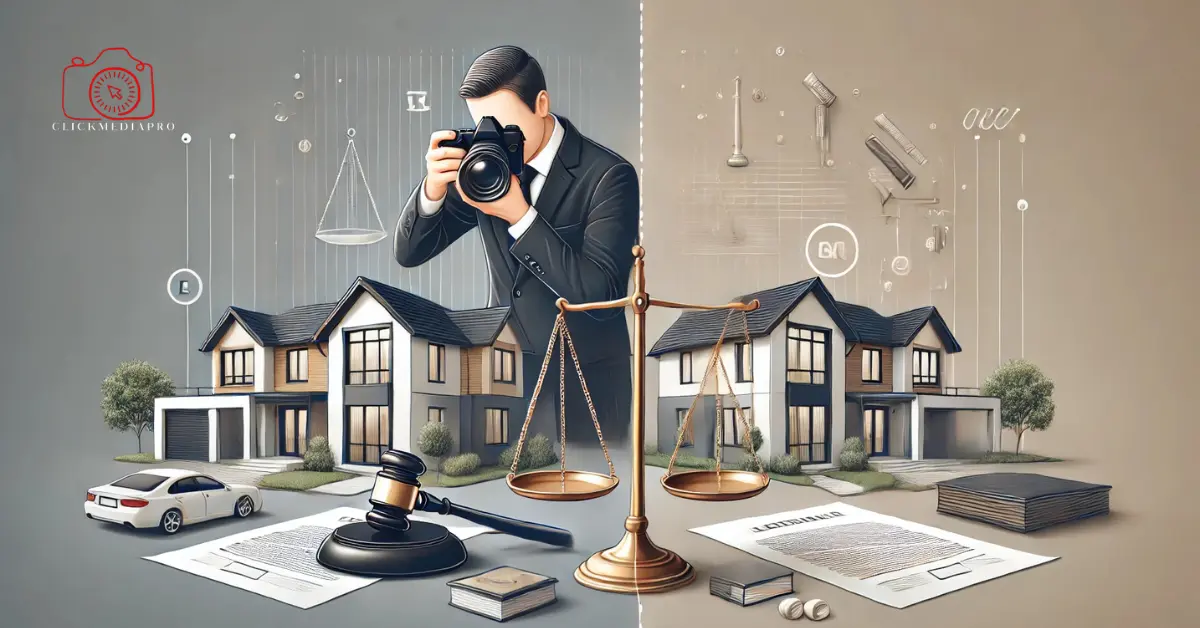Legal Considerations in Real Estate Photography – Real estate photography has evolved into a crucial marketing tool for property sales, rentals, and investments. Stunning images and videos can significantly impact how properties are perceived and how quickly they sell. However, beyond the creative and technical aspects of real estate photography lies a complex legal landscape that both photographers and real estate professionals must navigate carefully.
Understanding the legal considerations surrounding real estate photography is essential for protecting the rights of photographers, property owners, and real estate agents. From copyright laws to privacy concerns and permissions, adhering to legal best practices ensures smooth business operations and mitigates potential legal risks.
This comprehensive guide explores the legal landscape of real estate photography, highlighting the critical issues of rights, permissions, and best practices to help photographers and industry professionals stay compliant and protect their work.
Table of Contents
ToggleCopyright Laws in Real Estate Photography
What Is Copyright?
Copyright is a form of legal protection granted to creators of original works, including photography. Under copyright law, the photographer automatically owns the rights to any photos they take as soon as the images are created. This ownership gives the photographer exclusive rights to use, reproduce, distribute, and license their work.
Discover the latest preconstruction homes in Markham, Ontario and explore exclusive opportunities to secure your dream home at unbeatable prices.
Photographer’s Rights
For real estate photographers, owning the copyright to their images means they control how their work is used. This includes:
- The right to sell or license images to real estate agents or developers.
- The ability to prevent unauthorized use or reproduction of their photos.
- The right to modify or adapt the images.
Work-for-Hire Agreements
In some cases, a real estate agent or company may require a photographer to sign a work-for-hire agreement. This agreement transfers copyright ownership to the client, meaning the client has full rights to the images. It’s crucial for photographers to carefully review and understand these agreements to avoid unintentionally giving up their rights.
Stay updated with expert insights and news on preconstruction projects in Ontario by visiting this comprehensive blog.
Licensing and Usage Rights – Legal Considerations in Real Estate Photography
Understanding Licensing Agreements
Licensing allows photographers to retain ownership of their images while granting others permission to use them under specified conditions. A license defines:
- Who can use the images
- How the images can be used (e.g., online listings, print advertisements)
- Where the images can be used (local, national, or international use)
- For how long the images can be used
Browse the most recent Markham real estate listings to find your perfect property in this thriving Ontario community.
Types of Licenses
- Exclusive License: Grants only one client the right to use the images.
- Non-Exclusive License: Allows the photographer to license the same images to multiple clients.
- Rights-Managed License: Limits usage based on specific terms like duration, media, and region.
- Royalty-Free License: Allows broad usage without paying royalties after the initial fee.
Unauthorized Use of Images
Real estate professionals must ensure they have the proper rights to use images in their marketing materials. Using images without permission can lead to legal action, financial penalties, and damage to reputation.
Explore market trends and tips for buying or selling property in Markham by visiting the ultimate Markham real estate blog.
Property Rights and Permissions – Legal Considerations in Real Estate Photography
Property Owner Consent
Photographing private property requires permission from the property owner. While exterior photos taken from public spaces are generally legal, interior photos and drone shots over private property demand explicit consent.
Best Practices:
- Obtain written permission before photographing interiors.
- Include permission for drone photography if applicable.
- Clarify the intended use of the images in the agreement.
Enhance your property listings with stunning visuals by partnering with real estate photography experts in Markham at Click Media Pro
Model Releases for Individuals
If a person appears in a real estate photo, especially in promotional content, photographers must secure a model release form granting permission to use their likeness. This is particularly important when staging homes with people present.
Drone Photography Regulations
Drone photography adds dynamic perspectives but comes with legal restrictions. In many countries, drone operators must:
- Be licensed (e.g., FAA Part 107 in the U.S.).
- Obtain permissions for flying over private property.
- Follow airspace regulations and safety protocols.
Failure to comply with drone regulations can result in fines and legal repercussions.
Privacy and Ethical Considerations – Legal Considerations in Real Estate Photography
Invasion of Privacy
Photographers must avoid capturing images that infringe on the privacy of property owners or neighboring properties. This includes:
- Avoiding photos of personal belongings or sensitive documents.
- Blurring out identifiable information like license plates or house numbers.
Staging and Representation
Ethically, real estate photography should represent the property accurately. Over-editing images or using misleading photos can lead to legal claims of false advertising.
Best Practices:
- Avoid digitally altering property size or structure.
- Disclose if images include virtual staging.
Intellectual Property on Display
Photographers should be cautious when capturing artwork, branded items, or copyrighted designs within a property. These items could raise intellectual property concerns if used commercially.
Contracts and Agreements – Legal Considerations in Real Estate Photography
Photography Contracts
A comprehensive contract protects both the photographer and the client. Essential components include:
- Scope of work
- Licensing terms and usage rights
- Payment terms and pricing
- Cancellation and rescheduling policies
- Liability and indemnity clauses
Indemnification Clauses
Including indemnification clauses protects photographers from legal action if a client misuses images or violates third-party rights. It shifts legal responsibility to the client if they breach the usage terms.
Handling Disputes
Dispute resolution clauses, such as mediation or arbitration agreements, provide a structured way to resolve conflicts without resorting to costly legal battles.
Best Practices for Legal Compliance
Obtain Written Permissions
Always secure written consent for property access, drone usage, and the use of images in marketing materials. This protects photographers and agents from legal disputes.
Clear Licensing Agreements
Define how images can be used and distributed through well-drafted licensing agreements. Avoid vague language and clarify restrictions.
Follow Local Laws and Regulations
Stay informed about local laws regarding photography, drone operation, and privacy rights. Regulations can vary by city, state, or country.
Respect Privacy and Avoid Misrepresentation
Capture properties truthfully and avoid invasive or deceptive photography practices. Disclose when images are virtually staged or digitally enhanced.
Implement Model Releases
Use model release forms when individuals are identifiable in photos. This ensures legal protection for using their image in marketing materials.
Common Legal Mistakes to Avoid
- Using Stock Images Without Licensing
Always verify licensing rights before using stock or third-party images. - Ignoring Drone Regulations
Unauthorized drone use can lead to legal penalties. - Lack of Written Agreements
Verbal agreements are risky—always formalize contracts in writing. - Overediting Images
Misleading edits can lead to false advertising claims. - Failing to Credit Collaborators
If working with stylists or editors, clarify how credits are handled.
Conclusion – Legal Considerations in Real Estate Photography
Legal considerations in real estate photography are more than just formalities—they are essential for protecting creative work, maintaining professional relationships, and avoiding costly legal issues. By understanding copyright laws, securing proper permissions, and following ethical practices, photographers and real estate professionals can create impactful marketing content while staying compliant.
Success in real estate photography depends not only on technical skills and creativity but also on adhering to legal best practices. Whether you’re a photographer, real estate agent, or property developer, staying informed and proactive about legal rights and responsibilities is crucial for long-term success in this competitive industry.

